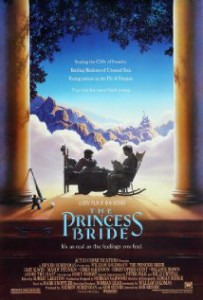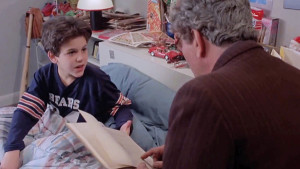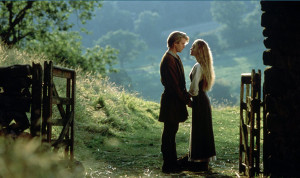 “Who says life is fair? Where is that written?” –The Grandfather
“Who says life is fair? Where is that written?” –The Grandfather
I am an escapist. You are too. But as we say at Reel World Theology, the entertainment that we escape through is not mindless. It has something very real behind it. So how does one escape through something that is remixing our everyday life? And why do we need to escape through it? The Princess Bride, quirky and fun as it so very much is, provides a good examination of these questions.
Fantasies, myths, and legends (oh my!) have always been a part of life. Through them we communicate ideals, teach morals, and adventure to strange new worlds. Film history is of course full of these tales- from sword and sandal epics to sci-fi opuses. Why then does The Princess Bride stick out among them? Among an almost endless list of impressive fantasy films, how does this quirky little story stay with so many of us?
It’s funny, to be sure. Put Billy Crystal, Carol Kane, Christopher Guest, and Mandy Patinkin in a film directed by Rob Reiner, you are sure to get an iconic, hilarious comedy. It’s romantic. The relationship of Westley and Buttercup hits at the heart of love on every level from cutesy (her name is Buttercup) to everlasting (Westley “dies” twice and it still can’t keep them apart.) It’s thrilling. Sword fights, battles of wit, castle “stormings,” those are the ingredients for a sweeping epic.
But there’s just something more to The Princess Bride that has made it a classic, can’t-not-watch-it film. Perhaps it is because it is self aware, never forgetting that the tale being told is fantastical and archetypal.
 The grandfather reads the story of Westley and Buttercup to his grandson who is at home sick. Through it, the boy escapes to a place beyond his imagination, further than where he might have gone just being stuck in his room alone playing video games. And oh, how we too long to escape our sickness, our pain, our everyday troubles and be swept away on adventures we can only imagine.
The grandfather reads the story of Westley and Buttercup to his grandson who is at home sick. Through it, the boy escapes to a place beyond his imagination, further than where he might have gone just being stuck in his room alone playing video games. And oh, how we too long to escape our sickness, our pain, our everyday troubles and be swept away on adventures we can only imagine.
“Life is pain, Highness. Anyone who says differently is selling something” -Westley
Why can’t it be simple? Imagine you are listening to a salesman give his pitch of a miracle cure, the one drug that heals many ills (coated in chocolate, perhaps!) We know this isn’t possible, that the drug can never really do what it claims to. But the salesman sure makes a good case for it. And we just may find ourselves reaching for our wallets, because those clever words he is crafting speak to something within us- a longing for perfection.
We want a world that isn’t broken. But as Westley reminds Buttercup, that’s not how life works. Life is pain, the world is broken. But at this point in the story Buttercup still believes she is talking to the Dread Pirate Roberts. Only Westley knows he is actually there to save her. So we see that even though life is pain, there is good to be found within it. And some of those good things are humor, adventure, and of course, love.
But we see through a glass dimly. If we are in a broken world where true perfection is unattainable, then we are left to see only shades of these good things. The everlasting love of Westley and Buttercup has a shelf life. They are mortal, so they will one day pass away. What then does the “ever after” part of “happily ever after” mean?
 It can be interpreted many ways, but the essence of it is hope. Hope for the truest love, which is one that cannot let us down, will not pass away, and has no shelf life. We search for that ever after in our adventures and fantasy stories, but in the end, though they are funny, thrilling, and romantic, we just end up closing the book, back in our bedrooms still with a fever and a cold.
It can be interpreted many ways, but the essence of it is hope. Hope for the truest love, which is one that cannot let us down, will not pass away, and has no shelf life. We search for that ever after in our adventures and fantasy stories, but in the end, though they are funny, thrilling, and romantic, we just end up closing the book, back in our bedrooms still with a fever and a cold.
But the hope is so important. Westley may have “died” when he went on his travels, but he always hoped to return to Buttercup and it was the very thing that helped him succeed. Inigo hoped twenty years to avenge his father, along the way knowing he might die. But as he echoes at the end of the film, the hope of fulfilling his quest gave him purpose. Just the same, it is essential that we continue to hope. Adventures like this help us do that. They remind us that despite life not being very fair there is love out there that can be everlasting. So even though the story must end and we must face the pain of life, just as the boy in the film does we can look forward to the next time we can hear a story that will take us on a journey far away.

